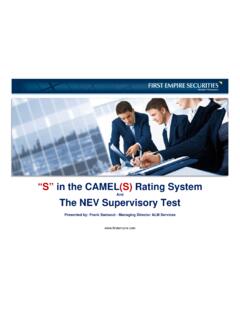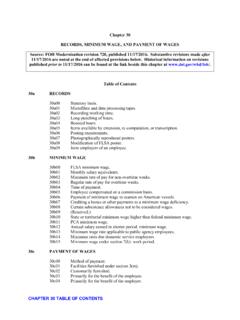Transcription of Department of Labor Fair Labor Standards Act (FLSA) Duties …
1 Department of Labor fair Labor Standards Act ( flsa ) Duties Test Questionnaire Exempt or Non-Exempt Instructions: 1. Read the criteria for each exemption category. 2. Place a in each box that applies to this position. You may check boxes in more than one exemption category. Give specific and detailed answers to the questions asked. 3. After checking the relevant boxes and providing detailed answers, please go to the first page and make a recommendation in the exempt or non-exempt box. Please note that an employee must meet the salary basis test to be exempt under the flsa .
2 If the person in the position earns less than the minimum required salary ($684 per week), the position is considered non-exempt and is subject to the overtime provisions of the flsa . The salary threshold must be based on a predetermined amount of pay constituting all or part of the employee's salary, which is not subject to reduction because of variations in the quality or quantity of work performed. Employers may use nondiscretionary bonuses and incentive payments (including commissions) paid on an annual or more frequent basis, to satisfy up to 10 percent of the standard salary level.
3 Additionally, if after the 52-week period, the employer has not met its financial obligation, the employer can make a final catch-up payment within one pay period after the end of the 52-week period to bring an employee s compensation up to the required level. Any such catch-up payment will count only toward the prior year s salary amount and not toward the salary amount in the year in which it is paid. Fact Sheet #17G: Salary Basis Requirement and the Part 541 Exemptions Employee s Name and Current Job Title Department Supervisor s Name and Title Date Completed Completed by Questionnaire Results Exempt status determination: EXEMPT NON-EXEMPT Department of Labor Duties Test Questionnaire Exempt or Non-Exempt Page 2 of 9 Executive Employee exemption Fact Sheet #17B.
4 exemption for Executive Employees Under the fair Labor Standards Act Exempt executive employees generally are responsible for the success or failure of business operations under their management. Other critical elements are (1) whether management is the employee s primary duty, (2) whether the employee directs the work of two or more full-time equivalent employees, and (3) whether the employee has the authority to hire/fire other employees or, alternatively, whether the employee s suggestions and recommendations as to the hiring, firing, advancement, promotion or other change of status of other employees are given particular weight.
5 YES NO Is the employee compensated on a salary basis at a rate not less than $684 per week? If no, stop. The employee is not exempt. Does the employee s primary duty consist of managing the enterprise or a customarily recognized Department or division thereof? If no, stop. The employee is not exempt. Does the employee regularly and customarily supervise two or more employees who are employed in the Department or subdivision that the employee manages? If any of the answers below are no, stop. The employee is not exempt. Interview, select and train employees?
6 Coach employees in proper job performance techniques and procedures? Direct the work of employees and set/adjust their rates of pay and hours of work? Maintain records on employee productivity for use in supervision or control? Appraise employee s productivity and efficiency to recommend promotions or other changes in status? Handle employee complaints and grievances and discipline employees when necessary? Plan other employees work and determine the techniques used in their work? Apportion work among different employees? Determine the types of materials, supplies, or tools to be used by other employees and control the flow and distribution of materials and supplies?
7 Provide for the safety of employees and the property of the employer? Control the budget? Monitor or implement legal compliance measures? Department of Labor Duties Test Questionnaire Exempt or Non-Exempt Page 3 of 9 Executive Employee exemption (continued) Exempt executive employees generally are responsible for the success or failure of business operations under their management. Other critical elements are (1) whether management is the employee s primary duty, (2) whether the employee directs the work of two or more full-time equivalent employees, and (3) whether the employee has the authority to hire/fire other employees or, alternatively, whether the employee s suggestions and recommendations as to the hiring, firing, advancement, promotion or other change of status of other employees are given particular weight.
8 YES NO Does the employee have shared responsibility for the supervision of the same employees in the same Department ? If no, stop. The employee is not exempt. Does the employee have the authority to hire or fire other employees? If any of the answers below are no, stop. The employee is not exempt. If no, is it part of the employee s job to make recommendations on hiring, firing, advancement, promotion or other change of status? Are the employee s recommendations frequently relied upon? What percent of working time does the employee spend providing the leadership Duties and responsibilities described above?
9 Click Here if 85% or more If less than 85%, stop. The employee is not exempt. Department of Labor Duties Test Questionnaire Exempt or Non-Exempt Page 4 of 9 Administrative Employee exemption Fact Sheet #17C: exemption for Administrative Employees Under the fair Labor Standards Act The Duties portion of the administrative exemption test establishes a two-part inquiry for determining whether an employee performs exempt administrative Duties . First, what type of work is performed by the employee? Is the primary duty the performance of work directly related to management or general business operations?
10 Second, what is the level or nature of the work performed? Does the employee s primary duty include the exercise of discretion and independent judgment with respect to matters of significance? All of the relevant factors must be considered when determining whether an employee in an administrative position is exempt. YES NO Is the employee compensated on a salary basis at a rate not less than $684 per week? If no, stop. The employee is not exempt. Does the employee s primary duty require the exercise of discretion and independent judgment with respect to matters of significance?


